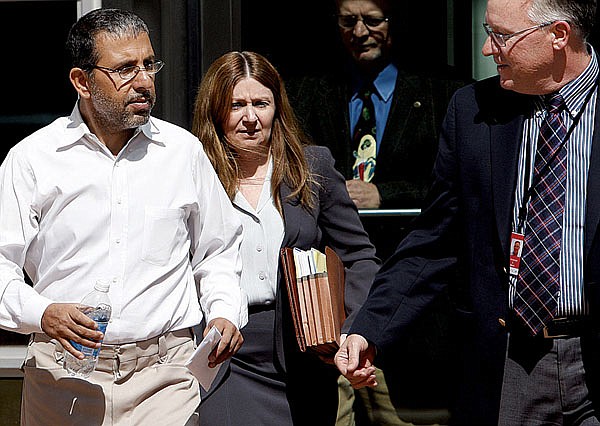WASHINGTON — Evidence of one of the most significant homegrown terrorism threats in nearly two decades unfolded Thursday as investigators described an advanced-stage plot to detonate explosives made with beauty-supply chemicals on American soil.
Using information gleaned from phone and e-mail intercepts, surveillance footage and receipts from venders, prosecutors drew a picture of Najibullah Zazi, a 24-year-old Afghan man at the center of the scheme, whom they accused of conspiring with at least three others in the co untry to deploy weapons of mass destruction in the form of hydrogen peroxide bombs.Zazi, who had permanent legal U.S. residency, was in "urgent" contact with al-Qaida operatives in Pakistan and had purchased and tested a volatile brew of chemicals before heading from his home outside Denver to New York this month, prosecutors said.
Attorney General Eric Holder assured the public that "any imminent threat arising from this case has been disrupted," but teams of FBI agents and members of the New York City police force continued to investigate "a wide range of leads," working around the clock, he said in a statement.
City police and federal agents are on the hunt for more suspects and associates, visiting storage facilities and chemical companies and interviewing members of the Afghan immigrant communities in New York, Denver and the Washington area as they search for leads and stray chemical compounds, according to two law enforcement sources.
Authorities have not yet determined whether Zazi and his confederates may have detonated explosives in a "test run" as other alleged bombers have done in the past, the sources said. They are turning up the heat on witnesses and possible targets of the investigation to signal that people who come forward and help fill in the missing links will be treated more favorably by law enforcement agencies, they added. The case already has prompted national warnings to sports stadium operators and transit authorities although officials emphasize those guidelines are "precautionary" measures.
Law enforcement officials sought to detain Zazi indefinitely on allegations that, if proved, could send him to prison for life.
A new indictment announced Thursday followed two weeks of frenzied law enforcement activity after Zazi traveled from his home to the Flushing neighborhood of the New York borough of Queens around the anniversary of the Sept. 11, 2001, terrorist strikes.
Zazi was an airport shuttle bus driver who journeyed to Pakistan in August 2008 for four months of training in weapons and explosives by operatives with ties to al-Qaida, investigators wrote in court papers. He returned to the United States in mid-January, quietly preparing to use the skills he had gained, investigators wrote.
As a U.S. resident, with the freedom to travel under the law enforcement radar, Zazi presented the type of threat that officials in the FBI, the Justice Department and intelligence agencies have long warned against.
"Not that I can think of since the first World Trade Center have we had al-Qaidatrained bomb-makers mixing explosives in the United States," said Patrick Rowan, a former chief of the Justice Department's National Security Division. "It's a really big deal, and I can appreciate that the FBI must be pressing on it."
For the first time since the case became public a week ago, prosecutors in the federal Eastern District of New York spelled out the evidence they had amassed against Zazi. Notes that authorities discovered in a file on Zazi's computer hard drive describe explosives including triacetone triperoxide, the chemical used in the 2005 London train bombings. Zazi accessed the document on his laptop in June and July 2009, searching the Internet for "hydrochloric acid" and bookmarking a site on "lab safety," prosecutors Jeffrey Knox, Berit Berger and David Bitkower wrote.
Zazi and three unnamed helpers purchased "unusually large quantities" of hydrogen peroxide and acetone products in July and August from beauty shops in and around Aurora, Colo., prosecutors wrote, citing surveillance video and receipts for "Ms. K Liquid 40 Volume" and other products. The aides traveled from New York to Denver to assist Zazi, using stolen credit cards, The Associated Press reported.
On Sept. 6 and 7, authorities say, Zazi rented a suite in a hotel in Aurora, where FBI agents later detected "the presence of acetone ... in the vent above the stove." The bomb-making instructions mention heating the components to make them "highly concentrated," prosecutors wrote.
On Sept. 9, Zazi rented a car, drove to New York and stayed overnight in a Queens apartment building, where investigators later found backpacks, cell phones and an electronic scale that FBI agents say could have been used to weigh possible bomb components.
Also Thursday, a well-known New York imam, Ahmad Wais Afzali, 37, appeared in federal district court in Brooklyn, where a magistrate judge set $1.5 million bail allowing for his release under electronic surveillance. Afzali was overheard on recorded conversations purportedly warning Zazi's father about law enforcement interest earlier this month. New York police intelligence unit officers, who had used the imam as a source in the past, consulted Afzali about the unfolding investigation, setting off a chain of events in which Afzali became a target, accused of lying to authorities.
"The imam did what law enforcement asked him to do," said Afzali's attorney, Ronald Kuby. Zazi's father, Mohammed Wali Zazi, also charged with misleading law enforcement agents in the investigation has been released and is being monitored electronically.
National security experts said that while much about the case remains unclear, including the possible target of the plot, it is significant.
"This rises to the top in terms of level of concern in the post-9/11 environment, given what appears to be direct connections to al-Qaida in Pakistan, clear intent to perpetrate an attack, and what appears to have been final stages of preparation," said Juan Zarate, deputy national security advisor for counter-terrorism to former President George W. Bush.
Information for this article was contributed by Robin Shulman and Julie Tate of The Washington Post.
Front Section, Pages 1, 9 on 09/25/2009

